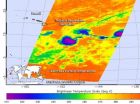(Press-News.org) As the U.S. economy slowly recovers, many investors remain wary about investing in the stock market. Investors' "risk tolerance," or their willingness to take risks, is an important factor for investors deciding whether, and how much, to invest in the stock market. Now, Michael Guillemette, an assistant professor of personal financial planning in the University of Missouri College of Human Environmental Sciences, along with David Nanigian, an associate professor at the American College, analyzed the causes of risk tolerance and found that loss aversion, or the fear of losing money, is the primary factor that explains investors' risk tolerance.
"Traditionally, it was believed that spending habits were the main driver of risk tolerance, meaning that the more variation an investor was willing to accept in their spending, the higher their risk tolerance for investments," Guillemette said. "Our study found that no such relation exists between risk tolerance and spending habits. Rather, loss aversion is a much more accurate indicator of risk tolerance. The more averse, or fearful, to losing money an investor is, the lower their tolerance seems to be for taking risks in the stock market. Consumer sentiment also appears to help explain investors' risk tolerance, though not nearly as much as loss aversion."
For his study, Guillemette, who is also a certified financial planner, analyzed data from a risk tolerance survey taken from 2003-2010. Guillemette focused on three potential drivers of risk tolerance: loss aversion, changes in investor spending habits and changes in consumer sentiment levels. Guillemette says it is important for risk assessment instruments to measure loss aversion, especially during times when the stock market is performing poorly. He says knowing how much investors are willing to risk at the worst of times is valuable for financial planners tasked with creating long-term investment plans.
"Financial planners probably acquire more accurate information on client risk preferences when risk tolerance is assessed in a hot state when stock prices are falling, compared to a cold state, when stock prices are rising," Guillemette said. "Now that we know loss aversion is a key factor that drives risk tolerance, it is important for investors to take steps to reduce their loss averse tendencies. This includes viewing investment returns infrequently, as investors allocate a greater percentage of their portfolio to stocks if they view their returns on an annual, as opposed to monthly, basis."
Guillemette says that encouraging investors to view their portfolios in a holistic manner also will help reduce loss aversion. Finally, he says research has shown that financial planners with the Certified Financial Planner™ designation can help increase investor certainty during periods of market turmoil.
INFORMATION:
This study is forthcoming in the Financial Services Review.
Fear of losing money, not spending habits, affects investor risk tolerance, MU study finds
2014-07-30
ELSE PRESS RELEASES FROM THIS DATE:
When cooperation counts
2014-07-30
Everybody knows the shortest distance between two points is a straight line, and now Harvard researchers have evidence that sperm have been taking the familiar axiom to heart.
Though competition among individual sperm is usually thought to be intense, with each racing for the chance to fertilize the egg, Harvard scientists say in some species, sperm form cooperative groups that allow them to take a straighter path to potential fertilization.
A new study, conducted by Heidi Fisher, a post-doctoral student working in the lab of Hopi Hoekstra, Howard Hughes Investigator ...
Scientists call for new strategy in pursuit of HIV-free generation
2014-07-30
In light of the recent news that HIV has been detected in the Mississippi baby previously thought to have been cured of the disease, researchers are assessing how to help those born to HIV-infected mothers. These infants around the world are in need of new immune-based protective strategies, including vaccines delivered to mothers and babies and the means to boost potentially protective maternal antibodies, say researchers who write in the Cell Press journal Trends in Microbiology on July 30th.
"There is a real need for additional HIV-1 prevention methods for infants," ...
Study: Marine pest provides advances in maritime anti-fouling and biomedicine
2014-07-30
A team of biologists, led by Clemson University associate professor Andrew S. Mount, performed cutting-edge research on a marine pest that will pave the way for novel anti-fouling paint for ships and boats and also improve bio-adhesives for medical and industrial applications.
The team's findings, published in Nature Communications, examined the last larval stage of barnacles that attaches to a wide variety of surfaces using highly versatile, natural, possibly polymeric material that acts as an underwater heavy-duty adhesive.
"In previous research, we were trying to ...
Dissolvable fabric loaded with medicine might offer faster protection against HIV
2014-07-30
Soon, protection from HIV infection could be as simple as inserting a medicated, disappearing fabric minutes before having sex.
University of Washington bioengineers have discovered a potentially faster way to deliver a topical drug that protects women from contracting HIV. Their method spins the drug into silk-like fibers that quickly dissolve when in contact with moisture, releasing higher doses of the drug than possible with other topical materials such as gels or creams.
"This could offer women a potentially more effective, discreet way to protect themselves from ...
NASA sees zombie Tropical Depression Genevieve reborn
2014-07-30
Infrared imagery from NASA's Aqua satellite helped confirm that the remnant low pressure area of former Tropical Storm Genevieve has become a Zombie storm, and has been reborn as a tropical depression on July 30.
Tropical Storm Genevieve weakened to a tropical depression on Sunday, July 27 and the National Hurricane Center issued their final advisory on the system as it was entering the Central Pacific. Now, after three days of living as a remnant low pressure area, Genevieve reorganized and was classified as a tropical depression again.
The Tropical Rainfall Measuring ...
Birthweight and breastfeeding have implications for children's health decades later
2014-07-30
Young adults who were breastfed for three months or more as babies have a significantly lower risk of chronic inflammation associated with cardiovascular and metabolic diseases, according to research from the Brown School at Washington University in St. Louis.
"This study shows that birthweight and breastfeeding both have implications for children's health decades later," said Molly W. Metzger, PhD, assistant professor at the Brown School and a co-author of the study with Thomas W. McDade, PhD, of Northwestern University.
"Specifically, we are looking at the effects ...
Appreciation for fat jokes, belief in obese stereotypes linked
2014-07-30
BOWLING GREEN, O.—From movies to television, obesity is still considered "fair game" for jokes and ridicule. A new study from researchers at Bowling Green State University took a closer look at weight-related humor to see if anti-fat attitudes played into a person's appreciation or distaste for fat humor in the media.
"Weight-Related Humor in the Media: Appreciation, Distaste and Anti-Fat Attitudes," by psychology Ph.D. candidate Jacob Burmeister and Dr. Robert Carels, professor of psychology, is featured in the June issue of Psychology of Popular Media Culture.
Carels ...
Many depressed preschoolers still suffer in later school years
2014-07-30
Children diagnosed with depression as preschoolers are likely to suffer from depression as school-age children and young adolescents, new research shows.
Depressed preschoolers were 2.5 times more likely to suffer from the condition in elementary and middle school than kids who were not depressed at very young ages, according to researchers at Washington University School of Medicine in St. Louis.
Their study is published in the July issue of the American Journal of Psychiatry.
"It's the same old bad news about depression; it is a chronic and recurrent disorder," ...
Penn researchers: Naltrexone may diminish impulse control disorders in Parkinson's disease patients
2014-07-30
(PHILADELPHIA) – Up to 20 percent of Parkinson's disease (PD) patients and their families may confront a common but largely unrecognized challenge: the occurrence of impulse control disorders (ICDs) such as compulsive gambling, sexual behavior, eating, or spending. Yet the presence of PD in these patients can severely limit or complicate treatment options. A team of investigators from the Perelman School of Medicine at the University of Pennsylvania and the Parkinson's Disease Research, Education and Clinical Center (PADRECC) at the Philadelphia Veterans Affairs Medical ...
Study: Telephone support program beneficial for caregivers of those with dementia
2014-07-30
PROVIDENCE, R.I. – Rhode Island Hospital researchers have found that a support program administered entirely by telephone can significantly reduce depression and other symptoms in informal caregivers, such as family or friends, of individuals with dementia. The study is published online in advance of print in the journal Alzheimer's & Dementia.
"Those caring for people with Alzheimer's disease or other forms of dementia are often under a great deal of pressure," said principal investigator Geoffrey Tremont, Ph.D, of the division of neuropsychology in the department of ...




